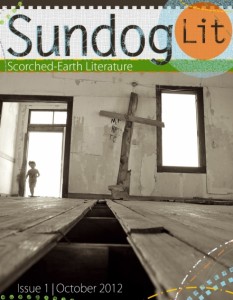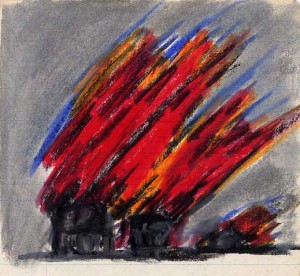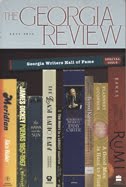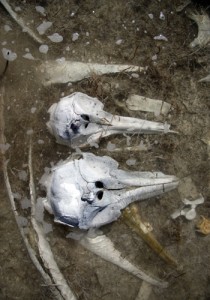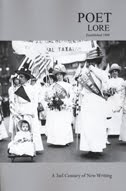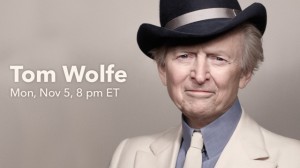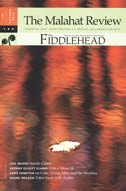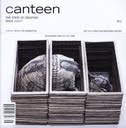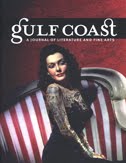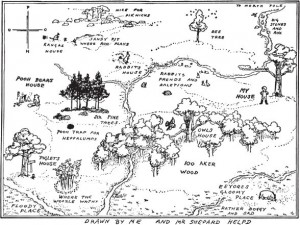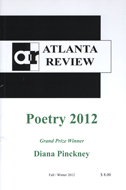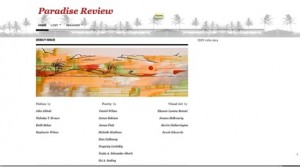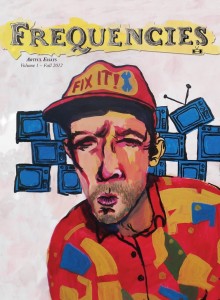Before you read The Medulla Review, take everything you think you know about our world and throw it out the window; the stories contained within the issue will challenge new ways to think about the way it actually works. You’ll discover a world in which all men turn, quite literally, into pigs; you’ll meet a man who removes, again quite literally, the faces of women before he can sleep with him; you’ll be introduced, in biography form, to Judas Horse, the world’s greatest cheese artist (“he is best known for his map sculptures of each of the fifty United States and territories of Puerto Rico, Guam and the USVI done entirely in cheese, chewed into shape by his own unique teeth”); and you’ll even find yourself navigating a maze as a lonely lab rat. Continue reading “The Medulla Review – 2012”
NewPages Blog
At the NewPages Blog readers and writers can catch up with their favorite literary and alternative magazines, independent and university presses, creative writing programs, and writing and literary events. Find new books, new issue announcements, contest winners, and so much more!
The Medulla Review – 2012
Spread the word!
The Fib Review – October 2012
Hear the name The Fib Review and you may think it is a journal dedicated to literature about lies. But actually, it showcases a unique form of poetry—the Fibonacci poem. Based off of the Fibonacci sequence (0, 1, 1, 2, 3, 5, 8, 13 . . . or Fn = Fn-1 + Fn-2), the poems use the number of words or syllables on a line to build the pattern, making the journal a wonderful creative outlet for math-lovers. Continue reading “The Fib Review – October 2012”
Spread the word!
On the Premises – November 2012
Populated by winners of each contest, each issue of this magazine has a different premise. This issue includes three winners and three honorable mentions on the premise of time. At first, I wasn’t looking forward to the pieces, expecting the classic race against time scenario, but I was pleasantly surprised to see time handled in a much different way. Continue reading “On the Premises – November 2012”
Spread the word!
Goblin Fruit – Autumn 2012
To set the feel for the rest of the issue, the editors of Goblin Fruit start it off with the haunting image of “The Vigil” by Mike Allen (for a visual of this “woman,” check out the art by Elisabeth Heller for the issue): “Where her eyes affix cannot be guessed. / Beneath a hat of iron wire / hang tattooed skins that veil her face.” Reading the rest of the issue, you’ll get the sense that she is watching you: Continue reading “Goblin Fruit – Autumn 2012”
Spread the word!
Halfway Down the Stairs – September 2012
This issue of Halfway Down the Stairs, the “Chaos” issue, features poetry, fiction, and nonfiction that have been written, as Editor Joseph Murphy says, by overcoming “chaos, distraction, frustration and more.” Continue reading “Halfway Down the Stairs – September 2012”
Spread the word!
The Writing Disorder – Fall 2012
If you’re looking for a great amount of reading packed into one issue, look no further than the latest issue of The Writing Disorder. And this issue is even larger than their typical issue, expanded to accommodate even more writing. Continue reading “The Writing Disorder – Fall 2012”
Spread the word!
Digital Americana – Fall 2012
Digital Americana is living up to its name; it is redefining literary magazines in the digital world and ever enhancing the reading experience. This special “Redact” issue encourages breathing new air into the writing already published there. Continue reading “Digital Americana – Fall 2012”
Spread the word!
The Bacon Review – October 2012
Although the November issue went live literally minutes after I finished reading this issue, I urge you to excuse the fact that this review is for the October issue. The October issue marks the magazine’s one year anniversary, and I figured it needed a celebration. And there’s a lot to celebrate here. Continue reading “The Bacon Review – October 2012”
Spread the word!
Five Quarterly – October 2012
For each issue, Five Quarterly publishes five poems and five pieces of fiction, all selected by five judges (which also change with each quarter). The judges for this issue are Stephen Paul Miller, Fernando Perez III, Jasmin Rosario, Cheryl Wilson, and Tiphanie Yanique. Continue reading “Five Quarterly – October 2012”
Spread the word!
NewPages Magazine Stand – November 2012
Got a bookstore or library near you with dozens of new lit and alt mags on the racks? Yeah, me neither, which is why we created the NewPages Magazine Stand for information about some of the newest issues of literary and alternative magazines. The Magazine Stand entries are not reviews, but are descriptions provided by the sponsor magazine. Sometimes, we’ll have the newest issue and content on our site before the magazine even has it on theirs. Good reading starts here!
Spread the word!
Sips Cards
 Sips Cards puts short (“lasts as long as a cup of coffee”) fiction and poetry into local coffee shop venues around the country (and in Scotland). Sips Cards is a publication run by artists, for artists. Each business card contains a QR code, loaded with a short story, or set of poems, from a writer meant to last as long as a cup of coffee. The cards include the issue’s author, story title, and website/e-mail.
Sips Cards puts short (“lasts as long as a cup of coffee”) fiction and poetry into local coffee shop venues around the country (and in Scotland). Sips Cards is a publication run by artists, for artists. Each business card contains a QR code, loaded with a short story, or set of poems, from a writer meant to last as long as a cup of coffee. The cards include the issue’s author, story title, and website/e-mail.
A QR code is free media media accessible with a barcode reader on any smart-type device, such as smartphones, iPods and iPads equipped with cameras, and other barcode scanning software. RedLaser and Barcode Scanner are two common, well reviewed apps, that are free to download and install on devices. These apps are easy to use and will also read typical linear barcodes.
A list of venues where Sips Cards can be found is available on the publication website, as well as contact information for letting Sips Cards know of a venue near you where you’d like to see the cards available.
Submissions for the Winter Issue (January) will be open through Friday, December 7th. The Winter Issue will contain two short story cards (each with one short story) and two poetry cards (each with one poem). There is a fee for submissions; authors whose works are selected receive payment.
Spread the word!
New Lit on the Block :: Sundog Lit
Sundog Lit is a brand new online magazine (which I recently reviewed on Screen Reading) that quarterly publishes literary fiction, creative nonfiction, poetry, and hybrid works as well as occasional video, photography, and art. “We started this magazine because we were tired of quiet lit, stories where nothing happens and people stand around, idle, wondering about life instead of living it,” says Managing/Founding Editor Justin Lawrence Daugherty. “Our mission is to publish literature that scorches the earth. We don’t want quiet. We want it loud and incendiary.”
The name comes from an atmospheric phenomenon in which bright spots of light appear in the sky near the sun, sometimes making it seem as if the sun were wearing a halo. Daugherty says that this dual-sun image was perfect to describe their magazine, one in which was about both serious literature and about being “active, destructive, generating, and explosive.”
The editors aim to leave an imprint on their readers, allowing the literature to stick with them even after the internet browser is closed. Daugherty also expresses that readers will find a community of writers. “We promote work through our Friday Rex series, book-promotions such as in our current Texts Inspired by Robert Kloss’ The Alligators of Abraham series.” In time, they hope to bring in more hybrid works and experimental essays, photography and art, contests, and themed issues.
The first issue includes fiction from Lindsay Hunter, Casey Hannan, Aaron Teel, Ryan Werner, Edward Hagelstein, Helen McClory, and Jesse Hertz; nonfiction from Matthew Gavin Frank, Laura Zak, and Will Kaufman; and poetry from Bianca Diaz, Sarah Wynn, Donald Parker, Jenna Lynch, Cameron Witbeck, Daniel Romo, Charles Rafferty, and Valentina Cano.
The deadline for the next issue is mid-January, and Sundog Lit accepts submissions through Submittable. The other editors of the magazine include Fiction Editor Mensah Demary, Nonfiction Editor Richard Hackler, Poetry Editors Zarah Moeggenberg and Amy Pajewski, and Website Design and Nonfiction Editor Cynthia Brandon Slocum.
Spread the word!
Broadsided: Responses to Superstorm Sandy
Moved by the plight of people affected by Superstorm Sandy, Brooklyn-based Broadsided artist Ira Joel Haber created the image featured here. Broadsided now asks writers to respond with words for Superstorm Sandy 2012. The editors will select the best responses and publish the resulting collaboration(s) with their December Broadsided feature, a pdf poster download. This is Broadsided’s second “Responses” feature. The first was to the 2011 earthquake and tsunami in Japan. Deadline for submissions: November 20.
Spread the word!
Georgia Writers Hall of Fame
The Georgia Writers Hall of Fame, established in 2000 as part of the Hargrett Rare Book and Manuscript Library, highlights authors who are either from Georgia or who have produced a significant piece of work while in Georgia. Among these writers are some very well-known names, but all of the writers’ works “reflect the character of the state—its land and people.” This fall, the Hall of Fame is celebrating its new home in the new Richard B. Russell Special Collections Building.
In accordance with this, The Georgia Review has put out a special fall issue to highlight the work of these authors. The writing included in this issue spans a timeline, and Editor Stephen Corey urges you to read it in order: “you will welcome the experience of observing the historical shifts of style, subject, tone, and even spelling and punctuation across nearly two centuries.” They were not able to highlight all forty-three current members, but they were able to feature thirty-two.
These writers include Augustus Baldwin Longstreet, Elias Boudinot, Sidney Lanier, John Chandler Harris, W.E.B. Du Bois, Georgia Douglas Johnson, Conrad Aiken, Jean Toomer, Lilian Smith, Ralph McGill, Erskine Caldwell, Johnny Mercer, John Oliver Killens, Carson McCullers, Byron Herbert Reece, Calder Willingham, James Dickey, Jimmy Carter, Flannery O’Conner, Robert Burch, Raymond Andrews, Harry Crews, John Stone, Coleman Barks, Terry Kay, James Kilgo, Alice Walker, David Bottoms, Philip Lee Williams, Judith Ortiz Cofer, Melissa Fay Greene, and Natasha Trethewey.
Spread the word!
Writers on Writing :: Glimmer Train Bulletin #70
The November issue of Glimmer Train’s eBulletin features craft essays by writers whose works have recently appeared in Glimmer Train Stories: Natalie Sypolt writes on “The Risk, the Reward of ‘Writing What You Know'”; Josh Henkin writes on “Consequence and Agency in Fiction”; Maggie Shipstead writes on “Focus”; David Ebenbach writes “Turquoise Shoes: Short Stories Care About the Little Things.” The bulletin is a free, monthly publication.
Spread the word!
Flyway Soars Online
Managing Editor Chris Wiewiora let us know that Flyway: Journal of Writing and Environment will be moving fully online as a literary magazine after their final print issue, which Wiewiora refers to as “a tome of an anthology.” Flyway will continue publishing online on a rolling basis. They hope to launch the new site around AWP 2013 – so stay posted.
In addition, Flyway has extended the deadline for their Notes from the Field contest, “a non-fiction contest celebrating writing about experience — whether that be abroad, on a familiar sidewalk, in one’s line of work, in a field of interest, or in the most unexpected of times and settings.” The catchphrase this year is: “Get your hands dirty!” Featuring guest judge, travel and non-fiction writer, Rolf Potts. Deadline: November 12
Spread the word!
American Life in Poetry: Column 398
American Life in Poetry
By Ted Kooser, U.S. Poet Laureate
David Hernandez is a Californian who knows how to have a good time with his writing. Here’s a delightful flight of fancy based on a negotiation with a postal clerk.
At the Post Office
The line is long, processional, glacial,
and the attendant a giant stone, cobalt blue
with flecks of white, I’m not so much
looking at a rock but a slab of night.
The stone asks if anything inside the package
is perishable. When I say no the stone
laughs, muted thunderclap, meaning
everything decays, not just fruit
or cut flowers, but paper, ink, the CD
I burned with music, and my friend
waiting to hear the songs, some little joy
after chemo eroded the tumor. I know flesh
is temporary, and memory a tilting barn
the elements dismantle nail by nail.
I know the stone knows a millennia of rain
and wind will even grind away
his ragged face, and all of this slow erasing
is just a prelude to when the swelling
universe burns out, goes dark, holds
nothing but black holes, the bones of stars
and planets, a vast silence. The stone
is stone-faced. The stone asks how soon
I want the package delivered. As fast
as possible, I say, then start counting the days.
American Life in Poetry is made possible by The Poetry Foundation (www.poetryfoundation.org), publisher of Poetry magazine. It is also supported by the Department of English at the University of Nebraska-Lincoln. Poem copyright ©2011 by David Hernandez from his most recent book of poems, Hoodwinked, Sarabande Books, 2011. Reprinted by permission of David Hernandez and the publisher. Introduction copyright © 2012 by The Poetry Foundation. The introduction’s author, Ted Kooser, served as United States Poet Laureate Consultant in Poetry to the Library of Congress from 2004-2006. We do not accept unsolicited manuscripts.
[]American Life in Poetry provides newspapers and online publications with a free weekly column featuring contemporary American poems. The sole mission of this project is to promote poetry: American Life in Poetry seeks to create a vigorous presence for poetry in our culture. There are no costs for reprinting the columns; they do require that you register your publication online and that the text of the column be reproduced without alteration.]
Spread the word!
Laura Kasischke Spotlighted
I take delight in skimming through the literary magazine pile every week, reading the editor’s notes, skimming through the table of contents, and seeing what’s new. In the same pile, I received a copy of The Main Street Rag (Fall 2012) and Poetry (October 2012), both of which featured a recognizable name on their covers: Laura Kasischke. In March, she was awarded The National Book Critics Circle Award for her book of poetry, Space in Chains; she has published eight books of poetry and eight novels; and she now teaches at the Residential College at the University of Michigan, Ann Arbor.
Featured on the cover of Poetry‘s 100th anniversary issue, she contributes four poems. You must read all of them, particularly “Game.” Here’s an excerpt:
I ran deeper
into the bright black trees
happily
as she chased me: How
lovely the little bits and pieces.
The fingernails, the teeth. Even
the bombed cathedrals
being built inside me.
Then, in The Main Street Rag, we get a little insight as Jane Andrews interviews her. Kasischke discusses her writing style, talks about her published pieces, and gives advice to writing students. “I think I’m a crock pot whether I’m writing poetry or fiction,” she says, “except that with fiction, I’m actively working on a piece of writing over a long period of time. With poetry, I’m only half-aware that I’ve got the crock pot plugged in and that I’m working on something.”
Make sure to check out both!
Spread the word!
Votes for Women: Cover of Poet Lore
The newest issue of Poet Lore features women in 1912 on a march in Manhattan for women’s voting rights. Poet Lore chose this as “an image that reminds us how slowly notions of equality have evolved, even in America. For another eight years, half of this nation’s adults would have no voice in a government purporting to be of and by and for the people. A century later, women’s issues that have drawn broad support in our time are again under fire—reproductive choice and pay equity among them. ‘Who has a voice in what?’ is a question that continues to challenge us, despite growing public approval for expanding freedoms rather than curtailing them.”
At the time of the march, Poet Lore was already well established (it started in 1889), created by Charlotte Porter and Helen A. Clarke. Current Editors Jody Bolz and E. Ethelbert Miller say that Porter and Clarke viewed literature as a form of action, as they do now. “A poet’s authority proves itself within the context of the poem, or it does not prove itself at all,” they write.
Contributors to this issue include José Angel Araguz, Javy Awan, David Bart, Samiya Bashir, Mark Belair, Jocko Benoit, Robert Brickhouse, Jennifer Case, Aimee R. Cervenka, Joanna Chen, Marilyn Chin, Ter Ellen Cross, Robin Davidson, Kwame Dawes, Sally L. Derringer, Julie Dunlop, Linda Dyer, David H. Ebenbach, Clara C. Fang, Marta Ferguson, Gary Fincke, Shelley Girdner, Tony Gloeggler, Sid Gold, Jeffrey Harrison, Lowell Jaeger, Andrew Jamison, Honorée F. Jeffers, Brandon Krieg, Gerry LaFemina, Gary Lark, Gardner McFall, Michael Milburn, Elizabeth Miranda, Carol Moldaw, Henry J. Morro, Kurt Olsson, Derek N. Otsuji, Marge Piercy, Christine Poreba, Zara Raab, Kristin Robertson, Joseph Ross, David Salner, Amy Schulz, Brittney Scott, Laurie Sewall, William Snyder Jr., Mark Sullivan, Kate Sweeney, Jason Tandon, Mark Wagenaar, Lillo Way, Julia Wendell, Mike White, and Debra Wierenga.
Spread the word!
Tom Wolfe Livecast Online: Tonight
Tonight at 8:00 p.m., Tom Wolfe will be part of 92Y‘s reading series. Wolfe’s newest book is Back to Blood, a novel set in modern-day Miami about “race, sex, art, and immigration.” He will sit and talk with Unterberg Poetry Center Director Bernard Schwartz. They will be taking questions via twitter using the hashtag #Wolfe92Y
Spread the word!
Election Day Eve Books of Interest
If the current election cycle has not completely dampened your enthusiasm for politics and activism, you may be interested in a handful of political titles recently received here at NewPages. If it has, then wait for 2013 to clear your political palate, then start fresh with one of these interesting reads:
Billionaires & Ballot Bandits, published in September 2012 by Seven Stories Press, is an unabashedly liberal book from journalist Greg Palast. Palast is known for his investigative reporting of the controversial 2000 election—specifically, voter fraud in the state of Florida, and how Katherine Harris removed more than 50,000 names from the voter rolls as felons. This makes it all the more amusing that among the blurbs on the back of the book, including those from Noam Chomsky and Al Sharpton, Harris is listed as well: “Twisted and maniacal” is her “recommendation.” Palast is actually offering free downloads (donation optional) of his book through Election Day at this page on his website. Read it for the history of Palast’s reporting over the years, fueled by unapologetic outrage.
A handy resource for writers, bloggers, and those who want to sound impressive at dinner parties, What Liberals Believe (Skyhorse Publishing, September 2012, edited by Dr. William Martin) is a veritable Bartlett’s Familiar Quotations of liberal quotes. Originally published in 2008, this updated second edition has information on the 2012 election and a section called “The Best of the Obama Years and More.” The book is organized by broad categories, each containing specific topics (for example, “The Struggle for Equality” encompasses “Civil Rights,” “Diversity,” “Gays and Lesbians,” and “Intolerance,” among others). Quotes run the gamut throughout time, from Aesop and Buddha to Jon Stewart and Barack Obama.
What You Should Know About Politics…But Don’t, by Jessamyn Conrad, is also out in a second edition from Skyhorse Publishing (May 2012). Conrad’s non-partisan guide to political issues is divided into 13 chapters, each devoted to a broad topic—civil liberties, the environment, education, etc. This edition has been most heavily updated, since its original publication in 2008, in its chapters on the economy and foreign policy. Conrad’s goal is to present each issue framed by its arguments on both sides. Each chapter begins with a bulleted list of background facts, and key terms are highlighted in bold throughout.
Lastly, for those interested less in political issues and more in the theory behind change, Skyhorse has also published The American Spring: What we talk about when we talk about revolution (July 2012). Journalist Amelia Stein interviewed 26 artists, professors, filmmakers, activists, writers, and more. Her questions are designed not only to illuminate the interviewee’s background (“Describe…your first political experience”) but also to provoke additional discussion (“How much of knowledge is experiential?”). The resulting topics of conversation vary, from the importance of Emma Goldman to the Occupy Wall Street movement to nonviolent protest.
Get out and vote tomorrow, and then keep reading!
Spread the word!
Pongo Poetry Prize Winner & Teaching Resources
The Pongo Poetry Prize is presented quarterly to a poem by a youth that is submitted on the Pongo web site. The prize winner also receives a $50 award. An archive of the winning poems and honorable mention awards can be found here.
“Where I Come From” was selected as the winning poem for August and can be read in full along with the honorable mention award poems on the Pongo Project Blog.
The Pongo web site has a writing activity on the theme of “Where I Come From” that can be used by teachers in the classroom or facilitators of writing groups.
The Pongo Teen Writing Project mentors personal poetry by teens who’ve suffered childhood traumas, such as abuse and neglect. The writers work with youth inside jails, shelters, psychiatric hospitals, and other sites. They help youth worldwide through the interactive writing activities on our web site. Their primary purpose is to help our authors understand their feelings, build self-esteem, and take better control of their lives.
Spread the word!
Haiku Wanted
Broadsided Third Annual Haiku Year in Review Contest is on!
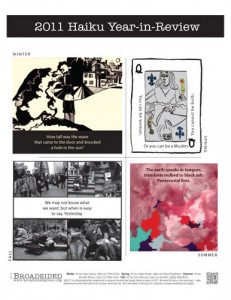 “Four artists are creating work in response to an event that, for them, dominated a season of 2012. We now ask for submissions of haiku that address the same topics. The art and the poems selected as finalists will be posted online, and YOU will vote on the winning combinations. The whole shebang will be published as January’s Broadsided collaboration.”
“Four artists are creating work in response to an event that, for them, dominated a season of 2012. We now ask for submissions of haiku that address the same topics. The art and the poems selected as finalists will be posted online, and YOU will vote on the winning combinations. The whole shebang will be published as January’s Broadsided collaboration.”
See full guidelines here.
About Broadsided:
Edited by Elizabeth Bradfield, Gabrielle Calvocoressi, Sean Hill, Alexandra Teague, and Mark Temelko, Broadsided has been putting literature in the streets since 2005. Each month, a new broadside is posted both on the website and around the nation.
Writing is chosen through submissions sent to Broadsided. Artists allied with Broadsided are emailed the selected writing. They then “dibs” on what resonates for them and respond visually – sometimes more than one artist will respond offering a selection of broadsides.
The resulting letter-sized pdf is designed to be downloaded and printed by anyone with a computer and printer. The goal is to create something both gorgeous and cheap, to put words and art on the streets.
The site contains a gallery of past broadsides, a map of cities/state/countries that have been broadsided (and where you can add yours), and links to other broadside sites.
Spread the word!
Essential East and West Coast Writing
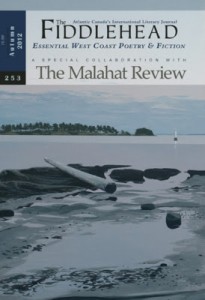 The Malahat Review, a west coast Canadian lit mag, and The Fiddlehead, Atantic Canada’s International Literary Journal, collaborate on their autumn issues to create two unique and complimentary collections. The Malahat Review‘s issue is titled “Essential East Coast Writing” while The Fiddlehead‘s is “Essential West Coast Writing.”
The Malahat Review, a west coast Canadian lit mag, and The Fiddlehead, Atantic Canada’s International Literary Journal, collaborate on their autumn issues to create two unique and complimentary collections. The Malahat Review‘s issue is titled “Essential East Coast Writing” while The Fiddlehead‘s is “Essential West Coast Writing.”
The work inside comes from writers with strong connections to the regions. The editors say, “The poems, short stories, essays, interviews, and reviews they have published in these issues don’t necessarily betray an affiliation to any particular ‘regional’ theme, focus, or aesthetic. However, we believe that ‘sense of place’—and a sense of the lives lived on either coast—does ‘issue’ from a reading and appreciation of each magazine’s take on the other’s region.”
And this was no easy task; the editors have been hard at work planning this venture for two years. And although the issues are now out and being distributed, they aren’t going back to their own corners of the country; they have a special blog dedicated entirely to this project. They hope it will spark dialogue and communication about what differs between east and west coast writing—and what unites it.
Spread the word!
Canteen Editor Change
With the publication of Canteen‘s newest issue comes the end of Executive Editor Mia Lipman’s work with the magazine. She says that “it’s been more thrilling than dismaying to see the steep evolution of literary media since my cofounders and I first imagined the scope of our journal. We pictured it only in print that night in Brooklyn. But as we put the final touches on our inaugural iPad edition last year, it didn’t feel like a concession–it felt like a natural complement.”
The issue features Joshua Mohr, Rachel Howard, Marina Read Weiss, Marcus Jackson, Greg Vargo, Stacey Duff, Shanthi Sekaran, Gordon Edgar, Marlerie Willens, Matthew Aaron Goodman, Rowland Stebbins, Dave Katz, Sonny Smith, and an intriguing cover by Scott Campbell.
Spread the word!
Vancouver International Writers Festival Contest Winners
subTerrain‘s newest issue features the winners of the Vancouver International Writers Festival Contest:
Poetry
Winner: John Xiros Cooper for “O Season, O Cities”
Runner-up: Joanna Lilley for “Biology Lesson”
Fiction
Winner: Leah Bailly for “Spiritus Mundi”
Runner-up: Stephanie Gray for “Pure White Light of Heaven”
And I have to just share a few titles of other pieces in this issue that are going to make you want to read them: “The Memory Machine Dreams of Forgetfulness” (John Belshaw), “A Form of Grace Already Forgotten” (Philip Quinn), and “How It Happens that You’ve Fathered a Child and It Shouldn’t Matter to Me When I Find Out Via Social Media” (Emily Davidson).
Spread the word!
Western Avenue
Don’t let the title of Fred Arroyo’s latest collection of short stories, Western Avenue and Other Fictions, fool you. “Fiction” is hardly the right word for what Arroyo has done here. If these insightful, living, breathing stories are fiction, I’d be hard pressed to imagine what reality must look like. Continue reading “Western Avenue”
Spread the word!
The Tree of Forgetfulness
The Tree of Forgetfulness, by Pam Durban, is the winner of the Lillian Smith Book Award. The novel is based on the true event of the lynching of three blacks in Aiken, South Carolina—a town in which forty-one lynchings had been investigated in the eight years prior to the one in 1926. The characters, fictional, are few: Howard and Libba Aimar and their son, daughter and unborn grandchild; Minnie and Zeke Settles, the Aimars’ black help; Aubrey Timmerman, the sheriff, who does the law his way; and Curtis N. R. Barrett, the New York reporter sent to find who really committed the murders, the three bodies so shot up and burned, they were a horror to view. The Confederate flag, bootleg whisky, the Klan, as well as good Southern manners and antebellum descendants whose heritage of “how it used to be” are all here, but the book is a series of levels moving downward from community to the individual, propelled by the interior dialogue of the characters, until we come to the real story. Continue reading “The Tree of Forgetfulness”
Spread the word!
Conversations with Anne
In the opening of an interview with director Elizabeth LeCompte, Anne Bogart asks where LeCompte and her company get the permission to create work so “unlike what you see in most theatre.” She responds: “it comes from having a space that’s mine, that’s ours, our very own. So when I start work, there’s not anything that’s saying to me that you have to do this for somebody else. If it doesn’t work, then I don’t owe anybody anything.” Conversations with Anne, a series of twenty-four interviews conducted by Bogart, the artistic director of the SITI Company and professor of the graduate directing program at Columbia University, could be approached with the same mindset—this is a book about having your own space to voice thoughts: thoughts on art, the theatre, human emotion, fragility, strength of character. These interviews, held within a ten-year period after the 9/11 attacks, are all connected in some way to the theatre and the world of performing arts, though this piece is not restricted to the theatre-loving reader. Continue reading “Conversations with Anne”
Spread the word!
The Incurables
Thoughts of death, specifically suicide, dominate Mark Brazaitis’s The Incurables, winner of the Richard Sullivan Prize in Short Fiction. The collection masterfully adds a spoonful of eccentricity however, as the dour characters seem to shrug off their plight, almost as if their strange adventures were as pedestrian as their hometown of Sherman, Ohio. Continue reading “The Incurables”
Spread the word!
Boarded Windows
I always judge a book by its cover, and then I check the blurbs. I know, there’s a behind-the-scenes history of blurbing books, friends helping friends, paying back owed favors, etc. But still, the marketing world seems to have zeroed in on what and whom I like. When I saw a turntable on the cover of Dylan Hick’s debut novel, Boarded Windows—well, being of the turntable generation, I was intrigued. Then I checked out the blurbs (Sam Lipsyte, Dana Spiotta, Greil Marcus), and I was hooked. I went home and digested the book. Continue reading “Boarded Windows”
Spread the word!
Dip My Pacifier in Whiskey
When my copy of Dip My Pacifier in Whiskey arrived in the mail, I could not wait to get reading. I don’t tend to judge a book by its cover, but rather by its title. To me, it seemed like a play on the adult child, and it had been awhile since a title instantly hooked me. The book cover is black with red brush strokes, simple but still interesting. Unfortunately, I really struggled to find a solid sample of writing to lure readers to this book of poetry. Continue reading “Dip My Pacifier in Whiskey”
Spread the word!
Glorious Nemesis
The turbulent life of Czech writer Ladislav Klíma is echoed in one of his works of fiction, Glorious Nemesis. Born in 1878 in Bohemia (today the Czech Republic), Klíma was expelled from school in 1895 after ostensibly insulting the ruling Hapsburgs. From then on, he rejected most aspects of a traditional life, shunning regular employment to live off of inheritance money and publishing royalties. Before he died of tuberculosis in 1928, he destroyed a reputed 90% of his own manuscripts. A great deal of what he wrote was published posthumously. Continue reading “Glorious Nemesis”
Spread the word!
Gulf Coast Prize Winners :: 2012
Gulf Coast magazine announces and publishes the winners of the 2012 Gulf Coast Prizes with the newest issue of the magazine. The fiction was judged by Victor LaValle, the nonfiction was judged by Jenny Boully, and the poetry was judged by Joyelle McSweeney. The winners and honorable mentions are as follows:
POETRY
Winner: “Pinnochia on Fire” by Lo Kwa Mei-en
Honorable Mention: “Autobiography with God Complex and Epidemic” by Jennifer Militello
Honorable Mention: “The Great Die-Up” by Melissa Barrett
NONFICTION
Winner: “Sweetie, Sweetie” by Emily Watson
Honorable Mention: “Foiled” by Christiana Louisa Langenberg
Honorable Mention: “Wrapped Up in Skin, Hidden Behind Eyes” by Gina Troisi
FICTION
Winner: “The Glass-World Builder” by Geetha Iyer
Honorable Mention: “You Will Make Several Relaxing Cuts” by Ashley Chambers
Honorable Mention: “We Shall Fill Our House With Spoil” by Delaney Nolan
Spread the word!
It’s Baa-aack! NaNoWriMo
Ready, set, sharpen your pencils, fire up your computers – write! November is National Novel Writing Month. NaNoWriMo starts Nov 1 and ends at midnight Nov 30 – all you need to do is complete 50,000 words within the month and upload your novel to the site. Of the 256,618 participants last year, 36,843 were “winners” in completing the task. Needless to say, for at least the next few weeks, writing is not a lonely task!
Spread the word!
Top Ten Books With Maps
Another fun top ten list from The Guardian UK: Top Ten Books With Maps. Happy to see Winnie the Pooh made the list.
Spread the word!
Literature, Arts, & Medicine Database
Literature, Arts, and Medicine: This site, sponsored by NYU, is a resource I keep coming across in my research. Time and again, when working on analysis of literature, this site pops up, and I have found it immensely helpful in guiding some of my work. Specifically, “The Literature, Arts, & Medicine Database is an annotated multimedia listing of prose, poetry, film, video and art that was developed to be a dynamic, accessible, comprehensive resource for teaching and research in MEDICAL HUMANITIES, and for use in health/pre-health, graduate and undergraduate liberal arts and social science settings.”
Fine for med students, as a lit student/teacher, this site works great for me! Each entry specifies genre (including medium for art), keywords (which help direct analysis from a medical perspective and are linked to others with the same theme), summary and commentary. Bibliographic information is also provided.
Spread the word!
New Lit on the Block :: Mount Hope
Roger Williams University—situated on the shore of Mount Hope Bay in Rhode Island—is putting out a new biannual magazine called Mount Hope. It is available as a print issue as well as online via Issuu. They are looking for “good, literary, readable stories and poems” as well as essays and memoir. “Beyond writing,” says Editor Edward J. Delaney, “we like to run photography and graphic storytelling—a segment of a graphic novel or a stand-alone—with an emphasis on storytelling and literary merit.
Delaney says that Mount Hope is “the latest iteration of the literary magazine published for four decades at RWU, which has one of the first BFA Creative Writing Programs in the U.S., recently celebrating its 40th anniversary. Our mission is to give students hands-on experience and to support writers and the writing community.” Alongside Delaney is Poetry Editor Shelley Puhak and Adam Braver, writer-in-residence.
Within the magazine, readers will enjoy realistic, quality writing. “We favor stories in which something happens, and poetry that is not for insiders only,” says Delaney. They hope to “be a venue for lively work of interest to a general readership.”
The first issue features Steve Almond (nonfiction), Michael Cirelli, Christopher Hennessey (poetry), Denis Darzacq (photography), Matthew Hall (graphic novel), and interviews with Rick Moody and Lynne Sharon Schwartz.
They take submissions via email year-round with a three to six month cycle turn-around response. They accept simultaneous submissions.
Spread the word!
Feminist Guide to Horror Movies
Just in time for Halloween, Ms. Magazine has published two articles on feminist perspectives of horror movies:
Part One: Daddy Knows Best
“If you are looking for a good scare this Halloween season, cast your feminist eye on this recent rash of family-centered horror movies in which inattentive fathers leave their children vulnerable to being taken by aliens, monsters and demons.”
Part Two: It’s Not Just About Vampires
“Since Edward Cullen first graced the pages of a young adult novel in 2005, vampires have been the sexy bad guys du jour. But it’s not just the lingering fear that sex might lead to death that makes these nightmarish manifestations of sexual desire resonate with audiences.”
Photo via Ms. Magazine: Courtesy of Patricia.Pictures via Creative Commons 2.0
Spread the word!
Glimmer Train August Short Story for New Writers Winners
Glimmer Train has just chosen the winning stories for their August Short Story Award for New Writers. This competition is held quarterly and is open to all writers whose fiction has not appeared in a print publication with a circulation greater than 5000. The next Short Story Award competition will take place in November. Glimmer Train’s monthly submission calendar may be viewed here.
1st place goes to Natalie Sypolt of Kingwood, WV [pictured]. She wins $1500 for “My Brothers and Me” and her story will be published in the Winter 2014 issue of Glimmer Train Stories, out next November.
2nd place goes to Greg Schreur of Grand Rapids, MI. He wins $500 for “Third World Kroger” and his story will also be published in a future issue of Glimmer Train Stories, raising his prize to $700. This will be his first fiction to appear in print.
3rd place goes to Riley Johnson of Missoula, MT. He wins $300 for “Up the Snowy Grade.”
A PDF of the Top 25 winners can be found here.
Next deadline: Family Matters: October 31
Glimmer Train hosts this competition twice a year, and first place has been increased to $1500 plus publication in the journal. It’s open to all writers for stories about families of all configurations. Most submissions to this category run 1500-6000 words, but can go up to 12,000. Click here for complete guidelines.
Spread the word!
Job: Poetry Center Director
The College of Humanities at the University of Arizona is seeking applicants for the position of Executive Director of the Poetry Center, “one of the nation’s leading centers for the study and celebration of poetry.”
Spread the word!
International Poetry Competition Results
Atlanta Review announces and publishes the winners of the 2012 International Poetry Competition in their latest issue. The Grand Prize and $1,000 goes to Diana Pickney for her poem “The Artist Speaks to Her Unborn Paintings.”
The International Publication Prizes go to Dane Cervine, Susan Cohen, Sara DeLuca, Stacy Donovan, Starkey Flythe, Becky Gould Gibson, Ryan Hibbet, Margaret Hoehn, Lowell Jaeger, Donald Levering, Roy Mash, Jill McDonough, Joyce Meyers, Bonnie Naradzay, Meryl Natchez, Sherman Pearl, Marcia Popp, Wanda Praisner, Jendi Reiter, D. Wilder Roberts, Mark Steudel, Jeanne Wagner, Sarah White, and Laura Juliet Wood.
And the International Merit Awards go to Kathryn Baker, Rafaella Del Bourgo, J. David Cummings, Lynn Tudor Deming, John Flynn, Patricia Frisella, Eve Forti, Jerome Gagnon, Harriet Geller, Donald Gibson, Gayle Ellen Harvey, Ruth Hill, Bonnie-Sue Hitchcock, Alice Owens Johnson, Richard Kenney, Steven Lautermilch, Fred Longworth, Mike Lythgoe, Gloria Materson-Richardson, Bill Meissner, Julie J. Moore, Anne Johnson Mullin, Annette Opalczynski, Carol Quinn, Jessica Bane Robert, Brook Sadler, Lisa D. Schmidt, Andrew Turco, Mark Wagenaar, and Betsy Weir.
Spread the word!
2012 Able Muse Book Award Winner
Able Muse Press has announced that Frank Osen is the winner of the 2012 Able Muse Book Award. This year’s award was judged anonymously throughout by the Able Muse Contest Committee and then by final judge Mary Jo Salter.
Other finalists include:
- Sass Brown: USA-1000
- Ellen Kaufman: House Music
- Carol Light: Heaven from Steam – twenty-two skies and eighteen yets
- Richard Newman: All the Wasted Beauty of the World
- Stephen Scaer: Pumpkin Chucking
See the full list of finalists and honorable mentions here.
Spread the word!
Creative Nonfiction Revamp
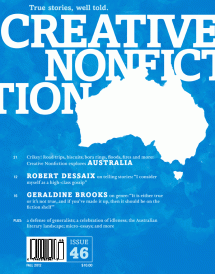 Creative Nonfiction magazine announced major changes to its website, subscription options, and submission process. The magazine debuted a new website design improving navigation through new web-exclusive content and digitized content from past issues.
Creative Nonfiction magazine announced major changes to its website, subscription options, and submission process. The magazine debuted a new website design improving navigation through new web-exclusive content and digitized content from past issues.
Some of this material dates back nearly twenty years, including founder and editor (and “Godfather behind creative nonfiction”) Lee Gutkind’s intros to all 46 issues, which serve as a veritable time capsule of the genre.
“With our 20th anniversary coming up in 2013, we’ve been thinking a lot about the history and development of the genre, but we also have our eye towards the future,” says Gutkind. “We’re proud to debut this new digital content, which we think will make the site a necessary destination both for readers who already have an artistic stake in creative nonfiction, and for anyone looking for an introduction to the genre. In the past twenty years, we’ve seen creative nonfiction become the fastest-growing genre in the publishing industry and within creative writing programs, and we know the audience for news, resources, and great writing within the genre is only going to grow.”
In addition, Creative Nonfiction has unveiled a digital subscription option, which will be powered through Zinio. The new digital subscription option lets readers download the magazine to a computer, iPad, Android device or KindleFire. A four-issue (full-year) digital subscription is $25. Single issues are also available.
The magazine will also begin accepting general submissions online, providing a more green and convenient method for writers to submit their work.
Spread the word!
Query Letter Advice
Edinburgh author Nicola Morgan offers a guest post on the Writers Beware Blog: “Dear Agent–Write a Letter that Sells Your Book.” Morgan, who lists her as her aka: the Crabbit* Old Bat (*Crabbit = “grumpy, prone to being irritable”) provides clear and friendly advice for writers in a tone that is anything but grumpy (she is a guest blogger, after all, she notes). Worth a look-see even if just for some affirmation.
Spread the word!
Fellowship :: Into the Wilderness
The Idaho MFA in Creative Writing Program has established a new writing retreat fellowship that gives students the opportunity to work in Idaho’s world famous wilderness areas. The competitive “Writing in the Wild” fellowship fully supports a student to spend a week at either the McCall Outdoor Science School (MOSS), which borders Payette Lake and Ponderosa State Park, or the Taylor Wilderness Research Station, which lies in the heart of the Frank Church River of No Return Wilderness. Both campuses offer year-round housing.
The writing retreats will allow students to concentrate solely on their fiction, nonfiction or poetry. Because both locations often house researchers, writers will also have the opportunity to collaborate with foresters, geologists, biologists and other scientists. Students visiting MOSS or Taylor Ranch will find expansive reaches of space to engage with rivers, lakes and forests.
Two “Writing in the Wild” fellowships will be granted in 2012-2013. Future plans include additional fellowships, as well MFA writers sharing their wilderness experiences in K-12 schools to demonstrate how the state’s natural wonders can foster creativity, innovation and inspiration.
Full application materials can be found on this page under Writing in the Wild Fellowships.
Spread the word!
Interview with Jos
The special feature of the new issue of The Bitter Oleander features an interview with the Swiss Francophone poet Jos
Spread the word!
New Lit on the Block :: Paradise Review
Paradise Review is a brand new online quarterly magazine featuring fiction, poetry, and visual art. Editor Joseph Han says that, along with his co-editor Joseph D. Lewis and poetry editor Lindsey Appleton, they want “to join the various online literary community already fostering across the globe, highlighting the hard work of writers who dare to put themselves out there with the hope of having their voices read and heard.”
The name refers to the location of the publication and also means “to communicate the idea that as an online mag, with work coming from absolutely anywhere, paradise is relative as a sense of accomplishment, state of mind/being, or physical space.” Han says that readers can expect to find “stories and poems that have moved and startled the staff as readers themselves, those that have begged to be shared and featured.”
The first issue features fiction from John Abbott, Nicholas T. Brown, Keith Rebec, and Stephanie Wilson; poetry from Daniel Wilcox, James Robinson, James Piatt, Michelle Matthees, Stan Galloway, Yevgeniy Levitskiy, Yvette A. Schnoeker-Shorb, and Zvi A. Sesling; and visual art from Jenean McBrearty, Karim Hetherington, and Sarah Edwards.
Han says that they hope to eventually become a monthly publication that features local and national writers. “We want to see a writer’s best,” he says. “By that, we mean writing that is believed in despite the preferences of other publications and the need to emulate different styles, literary figures, or contemporaries.” Submissions are accepted through Submittable.
Spread the word!
UMKC’s Tattoo of the Week
The University of Missouri – Kansas City news blog runs a weekly features: Tattoo of the Week. The latest entry spotlights junior English major Taylor Scholle’s tattoos, “inspired by her love of literature,” include images from Shel Silverstein and Norton Juster. Typing “tattoo” into the archive search box will bring up previous articles, each providing a photo and background story on the tattoo.
Spread the word!
New Lit on the Block :: Frequencies
The book publishing company Two Dollar Radio is starting a new project: a biannual print magazine called Frequencies. “We never set out to duplicate what others are doing and already doing well,” says Editor Eric Obenauf. “Artful essays cover an area that we felt wasn’t being sufficiently represented. With some inspiration from Occupy Wall Street, we wanted to champion work that celebrated the individual through both voice and vision. We’re billing Frequencies as a grungier, less self-righteous Harper’s.”
Obenauf says that readers can expect to find artful essays that “challenge the current nonfiction prescription.” Each issue has cover art and illustrations by John Gagliano. “The idea was to create a really taut arena,” says Obenauf, “so there are no empty calories in the form of music or book reviews, no random filler just to increase page count, which ideally totals an attractive space for writers to showcase their work.”
Alongside Obenauf is the interviews editor, Emily Pullen who, in the first issue, interviews poet Anne Carson. Other writers in the first issue include Blake Butler, Joshua Cohen, Tracy Rose Keaton, and Scott McClanahan with photography by Morgan Kendall.
The second issue “will feature Sara Finnerty on ghosts, Roxane Gay on issues of belonging in middle class black America, Alex Jung on the gay sex tourist trade in Thailand, Kate Zambreno on actress/director Barbara Loden, and more.”
Frequencies accepts submissions on a rolling basis; completed submissions can be sent via email as attachments. Frequencies does pay for published work. Please see the website for submission information.


